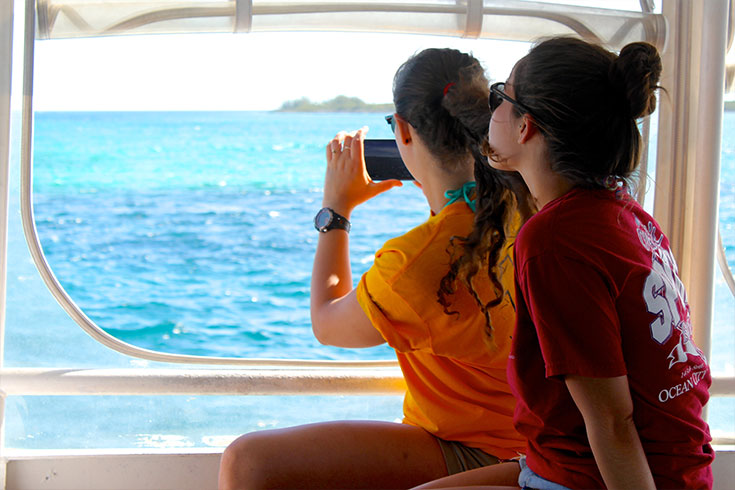Nassau, Bahamas
Six American students representing five clubs from the Boys & Girls Clubs of America spent a week in The Bahamas and several days at Dolphin Encounters on Blue Lagoon Island assisting with dolphin data collection and learning about dolphins, life below the surface and Bahamian culture. The group, which is a part of the Immersion Presents Dolphins Adventure Series traveled with world-renowned marine scientist, Dr. Kathleen Dudzinski to take part in activities that cover dolphin biology, behavior, sound, research tools, history, culture and careers.
The students, who range in age from 15-18, come from cities throughout the United States. They participated in various research and observation sessions with Dolphin Encounters’ dolphins, assisting with the collection of both video and audio data with Dr. Dudzinski’s unique underwater recording device. By the end of the weeklong trip, the group collected 5.5 hours of video with several sessions done observing mother-calf pairs. Dr. Dudzinski, who is a Scientist and Director of the Dolphin Communication Project, has studied dolphin communication for more than 17 years. She said she chose to bring the students to Dolphin Encounters because the facility offers the perfect studying environment for the kids, and has been very accommodating over the years.
“I conduct research in Japan, Honduras, as well as the Bahamas,” she said.
“Dolphin Encounters on Blue Lagoon Island was the best choice for this type of trip. The staff and the trainers here are unbeatable. They embrace the research goals we have and are genuinely interested in offering educational opportunities with students. The dolphins are very friendly and cooperative animals to work with. Although I also conduct research on dolphins in the wild I wanted to guarantee that the students would have an opportunity to meet and interact one-on-one with them.”
Dr. Dudzinski said while most of the kids have seen dolphins on TV, they had never come face-to-face with the marine mammals.
“There’s nothing quite like seeing them in person. You simply can’t explain it; it’s something you have to experience for yourself,” she said. “My research goals are important, but they’re equally as important as the educational goals. We want the kids to walk away with a greater respect for the dolphins and a better understanding of their communication habits and the environment in which they live, and the kids certainly embraced the activities and the animals.”
The Immersion Presents Dolphins Adventure Series consists of 12 activities about dolphins, according to Dr. Dudzinski.
“With those 12 activities in the program, we tailor them to specific age groups. So, depending on the group, we might teach them in lab or lecture styles. They get the opportunity to actually do the research for themselves,” she said.
“When the kids came to Dolphin Encounters, they did the Encounter program first. We set it up that way because they need to be comfortable with the animals, and they can’t do that unless they slip into the dolphin’s environment and their world. We then moved on to the career presentation, where they were taught how to collect data. This was a little hard to explain at first. But as soon as they began to play scientist they caught on. In the future, we’ll definitely do more data collection so that they can have a better understanding.”
Dr. Dudzinski said programs like the Dolphin Adventure Series also help to dispel a lot of preconceived notions that American students have about different cultures.
“Some students have this perception about what the Bahamas is. And their perception of the Bahamas basically comes from what they see on a resort flier. But there are so many different layers to this country and so it’s important that they see that,” she said. “Also, many of these kids have had sheltered lives. We want them to be environmental stewards and at the same time, be more tolerant of the different people that inhabit our planet.”
“What’s unique about this program is that not only do they learn about the dolphins, but they get a complete cultural immersion because they learn about the Bahamas in the process,” she said. “They got the opportunity to visit down town, Ardastra Gardens, take a powerboat trip to Exuma, and spend time at the Straw Market. They got to see the forts, experience the food and met new people.”
Dr. Dudzinski said the program will also help the students determine which path they want to take if they want to enter the marine biology field.
“Some of them are at a point now where they are deciding whether they want to go to college or not, and they’re looking to broaden their horizons. So they are starting to focus in on what it is that they really want to do. They can’t just be general and say ÔI want to go into marine biology,’ they really have to narrow it down. Programs like this help them decide which career path they wish to take,” she said.
Group leader of the immersion trip, Mary Ellen Mateleska, said the students have responded positively to the program.
“They enjoyed themselves. Learning alongside the Dolphin Encounters staff has been amazing. We had several programs and then we went on the beach and later on we experienced the sea lions. We also spent a day getting immersed into the culture. We visited the Pirate Museum. For a lot of the students it was their first time out of North America. What’s so great about this program is that it’s structured enough so that they learn something, but at the same time they have free time to explore and actually enjoy themselves as they experience the country.”
Dolphin Encounters Education Assistant, Sophia Smith explained some of the learning activities the kids took part in.
“We did a coral reef presentation, during that time they learned about the different types of coral reefs. We finished that off with a walk along the shore so that they could have a better understanding of the coastline and have basic interaction between the shore and reef. We also talked about possible marine careers and personal experiences. Many of the kids shared their experiences in the inter-tidal pool study. They also got a chance to interact with our sea lions. They really had a great time,” she said.
Mardee Jones, 19, from Minnesota said she has learned a lot about marine biology under Dr. Dudzinski’s tutelage.
“She’s absolutely amazing. She’s given us a lot of information that we didn’t know prior to this trip. She’s also very patient and knows how to break down the work so that it’s easy to understand. In school I requested this program, because I’m really interested in dolphins,” she said. “It’s great to see how the trainers interact with the dolphins and how they interact with each other. They really are fascinating animals.”
Johanna Cornejo, 17, from Florida said the immersion trip provided her with an opportunity to meet new people and discover new things.
“I love Bahamian culture. I think the people, the food and the spirit of this country are amazing. As we travel throughout Nassau we see people driving with the Bahamian flags attached to their cars, and we see the flags all throughout the city. It’s completely different from Florida. You can’t show one universal flag because people get offended,” she said.
“Coming here to Dolphin Encounters was amazing. The surroundings are so natural and beautiful and the animals seem so happy. This is an incredible environment to learn in.”
Raneisha Wright, a 14-year-old from Connecticut was fearful of dolphins prior to her encounter program. She refused to get into the water several times, but after getting into the water, she immediately conquered her fears.
“I’ve never seen them in person, and so I was afraid. I kept saying that I wouldn’t go in the water, but I knew I would be embarrassed later because the rest of the kids would talk about me and I didn’t want to be known as the scaredy-cat, so I just went in the water with them and I’m glad I did because it was wonderful,” she said. “As soon as I got in the water that fear went away. I love their skin and their rostrums. They really are friendly animals and they made me feel safe.”
“We really enjoyed hosting the students through Dolphin Encounters – Project BEACH,” said Annette Dempsey, Director of Education for Dolphin Encounters. “Our continued partnership with Dr. Dudzinski and her research allows local and international students the opportunity to learn more about dolphins and their natural behaviours. Through studies conducted with our dolphin family, scientists are able to compare behaviours with dolphins in the wild and provide greater understanding about all marine mammals. Research and education remain tantamount to our goals as a marine mammal facility.”


